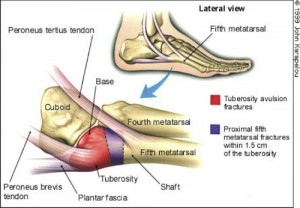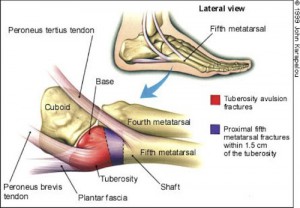

If you’re worried about the term ‘disease’ here – don’t be. Iselin’s disease or syndrome is a temporary growth-related condition that affects the outermost long bone in the foot called the fifth metatarsal.
It is a condition that impacts adolescents – meaning that it only affects physically active boys and girls between the ages of 8 and 14 years.
What causes Iselin’s disease?
As with many growth-related conditions like Sever’s heel pain or Osgood Schlatter’s knee pain, Iselin’s is caused by the painful inflammation of a growth plate. Growth plates are cartilaginous areas of bone to which new bone is added, allowing the bones to grow and lengthen in size. They are also softer and more vulnerable to injury. In Iselin’s, the inflammation of the growth plate in the fifth metatarsal of the foot is responsible for the pain.
Barefoot activity, jumping sports and narrow fitting footwear can be aggravating factors, as they can rub against, pull at or irritate the metatarsal. Individual biomechanical factors of the feet and legs need to be assessed and treated, as splaying of the forefoot associated with flat feet, and walking on the outside of the feet with high arched/inverted feet are also associated with Iselin’s disease.
It’s important to get the right diagnosis from your podiatrist as this problem can be confused with tendonitis, ankle sprains, fractures of the 5th metatarsal and more. It may also occur alongside an ankle sprain as rolling onto the outside of the foot may irritate the specific growth plate.
What are the symptoms?
 The pain will often start with no history of injury to the foot. The pain will be present on the outside of the foot, close to the ‘bump’ present on the outside of the foot called the styloid process. The pain will tend to worsen with activity and wearing tight footwear (like soccer boots) and should ease with rest. There may be some redness and swelling in the area, too. The pain may become so severe that your child may limp, though it may start as a dull ache or niggle.
The pain will often start with no history of injury to the foot. The pain will be present on the outside of the foot, close to the ‘bump’ present on the outside of the foot called the styloid process. The pain will tend to worsen with activity and wearing tight footwear (like soccer boots) and should ease with rest. There may be some redness and swelling in the area, too. The pain may become so severe that your child may limp, though it may start as a dull ache or niggle.
How is Iselin’s disease treated?
Your podiatrist will create a custom treatment plan for your child based on their specific symptoms, the sports they’re playing (if any), what’s triggering their pain and the biomechanics of their feet and legs.
Early treatment often starts with:
- Careful ice application to help reduce swelling
- Padding to offload the painful area
- Changes to regular footwear to avoid shoes that rub against the outside of the foot
- Orthotics to help with the biomechanical problems that are contributing to the pain, such as a supinated foot type and excess loading on the outside of the foot
- Specific stretching exercises
- Massage of the peroneals and any other muscles that may by pulling on the fifth metatarsal and contributing to the pain
While the pain will resolve over time, it is difficult to predict whether this will take weeks, months or years. Growth plates only ‘close’ and turn into solid bone once growth is fully completed.


